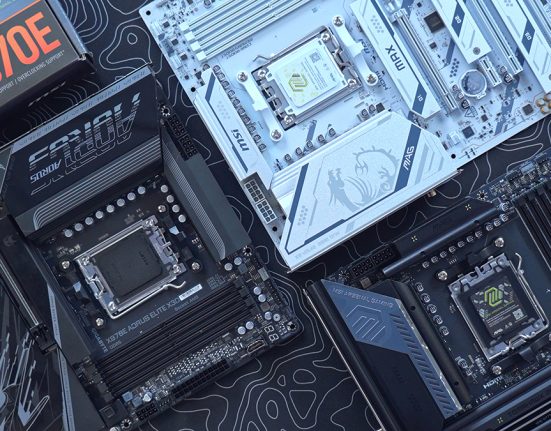The AMD Ryzen 7 7800X3D has long been regarded as the best gaming CPU on the market, offering leading performance with its 96MB of stacked L3 cache, rapid clock speeds, and superb single-core performance. Now, AMD’s top-end champion has a successor in the form of the brand new AMD Ryzen 7 9800X3D, a CPU AMD hopes will help them retain top spot against their own lineup of Ryzen 9000 processors and Intel’s latest Core Ultra release.
The threat posed by Intel to AMD’s top-end 7800X3D was perhaps a little overblown, with the former’s launch steeped in disappointment. The Ryzen 7 9800X3D is surely a home run, then, if it can deliver even minimal performance gains over the last-gen Ryzen 7 7800X3D, which itself still reigns supreme. In this review, we’ll be seeing if this really is the case by looking at the performance of this chip and comparing it against other options at similar price points.
Buy the AMD Ryzen 7 9800X3D on:
Ryzen 9000 Lineup
The AMD Ryzen 9000 lineup was first unveiled back at Computex in June of 2024, with AMD bringing their initial Ryzen 5, 7 and 9 releases to market. These chips are the standard ‘X’ and non-‘X’ versions, with the ‘3D’ chips typically landing a short time later. Now, we have the one and only Ryzen X3D chip from the 9000 lineup, at least so far, in the form of this Ryzen 7 9800X3D.
The 9800X3D is positioned between AMDs existing Ryzen 7 9700X, and the higher-end Ryzen 9 9900X, with a specific emphasis on gaming performance. That explains its relative lack of cores, with the same 8-core and 16-thread configuration as found on the previous generation Ryzen 7 7800X3D. I personally think this is more than adequate for gamers, the market this chip is specifically targeted towards. Those looking for better multi-core performance should look at AMD’s own Ryzen 9 CPUs or, dare I say, Intel’s Core Ultra 9 lineup.
At an MSRP of $479, the Ryzen 7 9800X3D is fairly competitive too. This is a $30 price bump over the Ryzen 7 7800X3D at launch 18 months ago, and is reasonable in our mind for what is likely to be the market’s new, fastest gaming CPU. It is worth noting that the existing Ryzen 7 7800X3D is currently priced well above MSRP at most retailers, owing to high demand and a lack of supply due to the upcoming 9800X3D refresh. The $479 price point is then worth taking with a pinch of salt, at least for now, until we see how real market pricing develops.

Specifications
In terms of specifications, the 9800X3D stacks up well against its predecessor, offering a healthy increase to both base and boost clocks. Base clock speeds have jumped fairly substantially to 4.7GHz, up from 4.2GHz, whilst the Boost clock sees a slightly more modest but a still welcome increase to 5.2GHz, up from 5.0GHz. At face value, the rest of the specs look similar across the board. However, upon diving deeper, more improvements have been made, particularly to the architecture, and that goes without looking at the overclocking support some of our eagle-eyed readers will have spotted.
The Ryzen 9800X3D does also offer support for slightly higher non-overclocked RAM speeds out of the box, sitting at DDR5-5600 (2x16GB) as opposed to DDR5-5200 (2X16GB). A nice change to have from a compatibility standpoint.
| Specifications | AMD Ryzen 7 7800X3D | AMD Ryzen 7 9800X3D |
|---|---|---|
| Core Count | 8 | 8 |
| Thread Count | 16 | 16 |
| Base Clock Speed | 4.2GHz | 4.7GHz |
| Boost Clock Speed | 5.0GHz | 5.2GHz |
| Max Cache | 96MB | 96MB |
| Default TDP | 120W | 120W |
| CPU Socket | AM5 | AM5 |
| Overclockable | No | Yes |
The Ryzen 9800X3D is the first AMD X3D processor to have full overclocking support, something that has been missing on past X3D chips. Thanks to improvements to the 3D V-cache, the 9800X3D is now a fully overclockable CPU, no longer restricted by high temperature and TDP consumption woes.
Unlike Intel, who often uses a ‘K’ to denote which of their CPUs are overclockable, AMD has stuck to its standardised X3D naming convention for the time being. Whether this will change moving forward as more X3D chips are released remains to be seen.

Architecture
The Ryzen 9800X3D is built using the existing Zen5 architecture, which debuted earlier in the year with the launch of Ryzen 9000. AMD has, however, since made further improvements for the release of the 9800X3D, most notably, the arrival of the 2nd generation 3D V-cache.
Unlike the 7800X3D and other past X3D chips where the 3D V-cache has been layered on top of the ‘Zen4 Cores’ (Ryzen 7000X3D) and ‘Zen3 Cores’ (Ryzen 5000X3D), AMDs latest technology moves the 3D V-cache in its entirety to below the Zen5 processor cores. By doing so, AMD has been able to leverage the already in-place cooling solution and directly interface it with the primary heat source, the new Zen5 Core Complex, to lower temperatures that bit further.
With the 3D V-cache being less sensitive to temperature than the processor cores, AMD looks to be onto a winner with this 2nd-generation 3D V-cache technology. By relocating the 3D V-cache and thus lowering the CPU temperatures, AMD has been able to increase the Base and Boost clocks of the 9800X3D without sacrificing temperatures. Something that has particularly been an issue with past rival launches. AMD looks to have one-upped their rivals with this 2nd generation 3D V-cache technology, and hopefully, this acts as a driving force to sustaining higher clock speed averages whilst maintaining sensible temperatures.

As expected, the 9800X3D continues to use the AM5 socket type used by the current 9000 crop of CPUs and is compatible with the current lineup of motherboards. With support for use with A620 and B650 motherboards through to higher-end X670(E) and X870(E) motherboards, users looking to upgrade from a 7000 series CPU should be able to do so without too many issues. It is worth noting, however, that some motherboards, particularly the last generation motherboards like the A620, B650, and X670(E), may require a BIOS update to work with the 9800X3D. You can find the BIOS files and instructions on updating your BIOS on the manufacturer’s website.
AMD Ryzen 7 9800X3D Competition
The release of the 9800X3D has come at an interesting and potentially tactical time. With early signs indicating a release date in Q1 of 2025, seeing the 9800X3D hitting the shelves so soon after the launch of Ryzen 9000 comes as a shock to many, myself included. The Ryzen 7 7800X3D wasn’t seen until roughly six months after the initial Ryzen 7000 launch, the 9800X3D however, comes a mere three months later.
Intel’s poor-performing Core Ultra launch looks to be the likely reason for the 9800X3D’s quick arrival. To put it lightly, Core Ultra was met with disappointing reviews, meaning the market is there for the taking if the 9800X3D is received anywhere close to the rave reviews its predecessor has received.
The Ryzen 7800X3D has been the top choice for Gaming PCs for a little while now, with neither the i7 14700K nor the more recent Core Ultra 7 265K managing to get close at a value for money or performance standpoint. The 9800X3D, however, looks set to shake up the market with solid clock speed increases at a reasonable price jump. On paper at least, the 9800X3D stacks up well against the competition from both Intel and AMDs respective lineups.
| Specifications | Intel Core Ultra 7 265K | AMD Ryzen 7 7800X3D | AMD Ryzen 7 9800X3D | Intel Core i7 14700K |
|---|---|---|---|---|
| Core Count | 20 (8P + 12E) | 8 | 8 | 20 (8P + 12E) |
| Thread Count | 20 | 16 | 16 | 28 |
| Base Clock Speed | 3.3GHz | 4.2GHz | 4.7GHz | 2.5GHz |
| Boost Clock Speed | 5.5GHz | 5.0GHz | 5.2GHz | 5.6GHz |
| Default TDP | 125W | 120W | 120W | 125W |
| CPU Socket | LGA 1851 | AM5 | AM5 | LGA 1700 |
| MSRP | $499 | $449 | $479 | $409 |
Even with the slight price increase on the 9800X3D, AMD has still managed to release their latest X3D chip at a lower cost than the Core Ultra 7 265K. With early signs in our own in house testing having the 9800X3D rivalling the Core Ultra 9 285K, AMD once again look set to reign supreme in the Gaming CPU sector.
As with all launches, particularly AMD launches, we expect the 9800X3D pricing to vary from its MSRP over time. If the 9800X3D is anywhere close to as popular as it predecessor has been, the inevitable stocking issues will likely cause similar price hikes. AMD are renowned, however, for releasing products at one price, only to reduce the price in the following months. Pricing of the 9800X3D, therefore, could vary, at which point its value offering versus its closest competition could swing either way in the coming months. From a performance standpoint, though, the 9800X3D looks to be a very solid offering.
Performance
Per our component reviews, we benchmark parts rigorously to determine where performance lies. The Ryzen 7 9800X3D was tested in gaming and synthetic applications to show how it copes in a standard gaming setting and more intense workstation-style loads. All the framerates in games and applications were recorded with CapFrameX where possible. Otherwise, data was taken from HWMonitor running in the background of each recording.
Cinebench
Cinebench single-core stress test is the first test we ran on the 9800X3D and if early signs are anything to go by the 9800X3D looks solid. Scoring 2104 in our testing, the 9800X3D slots itself right between the Ryzen 9 7950X3D and Intel Core i7 13700K on the graph.
Whilst the Ryzen 7 9800X3D was unable to dislodge any of the more current-generation Intel offerings, it comfortably beat out its predecessor. Scoring nearly 4000 points more than the 7800X3D at 1735, the 9800X3D performs well in a test designed for more workload-oriented scenarios as opposed to the gaming scenarios the X3D chips prefer.

The Multi-core stress test offered a similar narrative. The 9800X3D scored 23432, which is some way ahead of the 7800X3D score of 17972. Again, however, the 9800X3D pails in comparison to the lofty scores achieved by the likes of the i7 14700K and Core Ultra 9 285K. The X3D chips are, however, designed to stand out in gaming scenarios as opposed to workload tasks.

Battlefield 2042
Battlefield 2042 offered a more positive viewpoint. Averaging 218 FPS at 1080p High settings, the Ryzen 7 9800X3D cements itself at the top of the chart during our testing. Whilst it does so by just 4FPS, the 9800X3D did manage to put some daylight between itself and the 7800X3D. Early signs look to be positive for the 9800X3D, could we have a new CPU performance king on our hands?

At 4K High settings, the 9800X3D scored an average of 105 FPS. Although it places itself towards the top end of our graph, the 9800X3D fails to offer any improvement over the 7800X3D rather disappointingly. However, the 9800X3D does beat out all of the current-generation Intel Core Ultra offerings and loses out only to the two-generation old 13900K.

Marvel’s Spiderman Remastered
The 9800X3D returned to the summit of our testing graphs in Marvel’s Spiderman Remastered, averaging 192 FPS at 1080p High settings. Beating out even the likes of the Intel Core Ultra 9 285K ,the 9800X3D performed very well here putting some distance between itself and the rest of the competition. Offering a 7.25% increase over the 7800X3D, the 9800X3D falls right in line with the 8% generational increase touted by AMD themselves.

7800X3D vs 9800X3D
With the 7800X3D being the reigning champ when it comes to gaming performance, what better way to test the 9800X3D than to pit it head to head against its predecessor. To do this, I built a system using an Asrock X870E Taichi, RTX 4090 and 32GB of G.Skill Z5 RGB NEO DDR5 6000MT/s and tested both of the CPUs within the same PC across the same five titles, at identical settings.
At 1080p High settings it was a clean sweep for the 9800X3D, beating out the 7800X3D in every title that we tested. Performance did at times vary, however. Games such as Alan Wake 2 saw a 2% increase for the 9800X3D over the 7800X3D, and Apex Legends saw a negligible performance uptick, with both games reaching the in-game FPS cap. Titles such as Cyberpunk 2077 and Fortnite saw healthier performance uplifts. In Cyberpunk 2077, the 9800X3D saw a 5.63% increase, whereas Fortnite was the real winner, seeing a performance improvement of over 10%. On the whole, the 9800X3D averaged closer to a 5% generational increase over the 7800X3D. And whilst its not quite the 8% AMD have claimed, the 9800X3D does look to have dethroned the 7800X3D.

The positive readings continue for the 9800X3D when looking at the 1% lows too. The 9800X3D maintained much more stable and consistent frame rates than that of the 7800X3D. AMD have done a great job of increasing base performance with the 9800X3D, during testing I experienced far fewer FPS drops and smoother gameplay with the 9800X3D on the whole.
The generational uptick is much closer aligned with the 8% mentioned here too. Apex Legends saw the smallest improvement in the 1% low department with an increase of 3.33% over the 9800X3D. The remaining four titles of the testing session, however, all saw healthy increases when looking at 1% lows over the averages achieved by the 7800X3D. Call of Duty Black Ops 6 saw an increase of 9%, Cyberpunk 2077 saw an increase of 14% and Fortnite saw in excess of 43%! It’s safe to say the 7800X3D has been well and truly been surpassed in the performance department.

Conclusion
AMD Ryzen 7 9800X3D

Product Name: Ryzen 7 9800X3D
Brand: AMD
-
Features
-
Thermals
-
Performance
-
Value For Money
Summary
The AMD Ryzen 7 9800X3D could not have had a tougher act to follow than that of the Ryzen 7 7800X3D and yet it does a stellar job of doing so. Dethroning what has been the gaming performance king is no easy feat, but the 9800X3D has done so without breaking the bank or more importantly breaking itself through dangerously high temperatures or power consumption. AMD has done a great job of improving what was already a chart-topping product and repackaged it in a way that not only makes the performance of the CPU itself better but also the architecture as a whole. Moving the 3D V-cache location is a masterstroke on AMD’s part and should help not only the performance of the 9800X3D but also the X3D chips moving forward, allowing AMD to unlock higher clock speeds without sacrificing temperatures.
Pricing is competitive, with only a $30 increase for an improvement on what was already a performance chart-topping CPU in the 7800X3D, and is all the more competitive when weighing up the 9800X3D against the current crop of Intel CPU offerings.
Yes, at times and in certain titles, I would have liked to see slightly more generational performance uplift than a couple of percent, but who wouldn’t? On the whole, the Ryzen 7 9800X3D has dethroned the current king and cemented itself as the fastest gaming CPU on the market, all while improving thermals and becoming a trailblazer for X3D chips to come. What more could we ask for?
Pros
✅ Strong 1% Lows
✅ 2nd Gen 3D V-cache
✅ Competitive pricing
Cons
❌ Weak synthetic benchmarks
❌ Lower performance uplift than claimed
❌ Low Multi-threaded performance


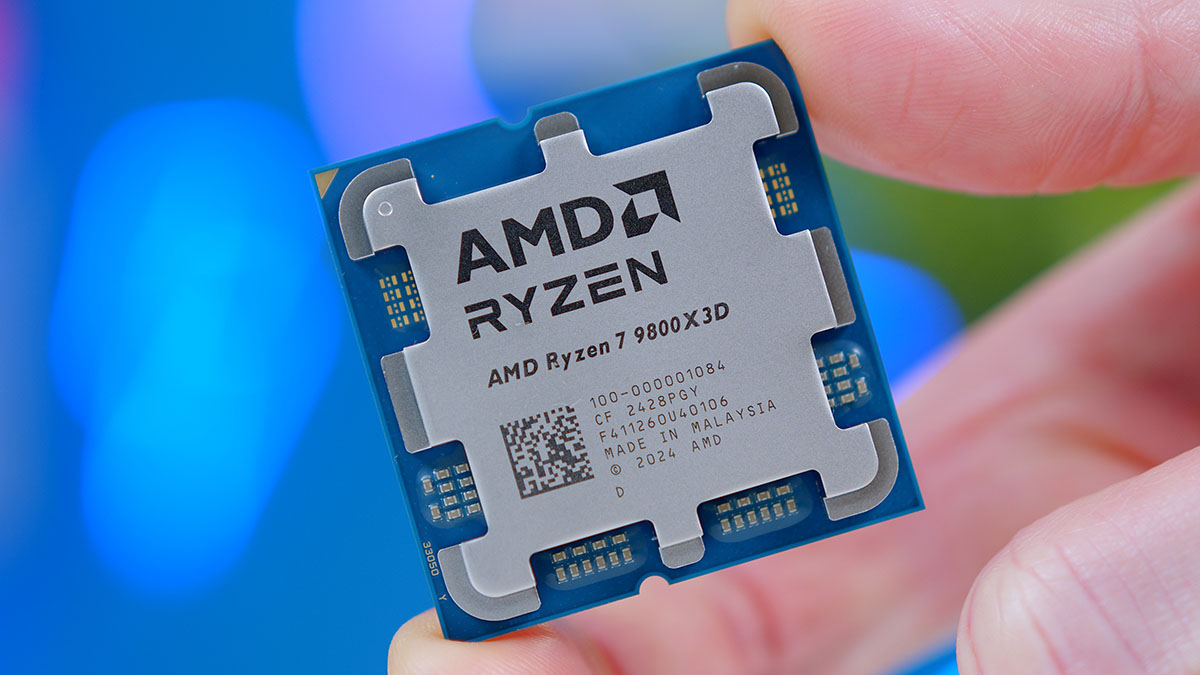
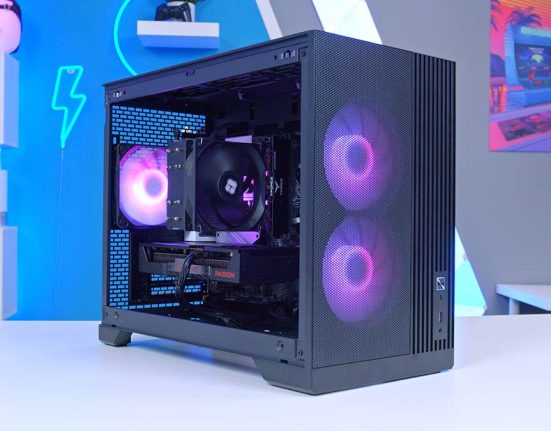
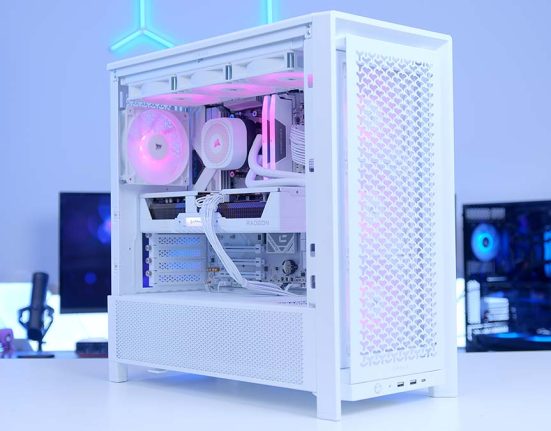
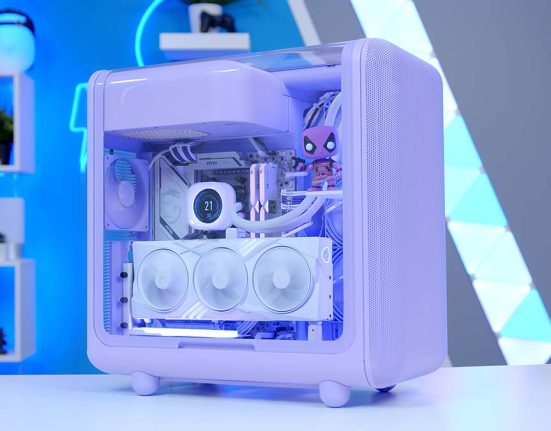
![FI_[DM87] HAVN BF & RTX 5090 Build](https://geekawhat.com/wp-content/uploads/2026/01/FI_DM87-HAVN-BF-RTX-5090-Build-551x431.jpg)
![FI_[DM86] Montech King 45 Pro + RX 9070](https://geekawhat.com/wp-content/uploads/2026/01/FI_DM86-Montech-King-45-Pro-RX-9070-551x431.jpg)
